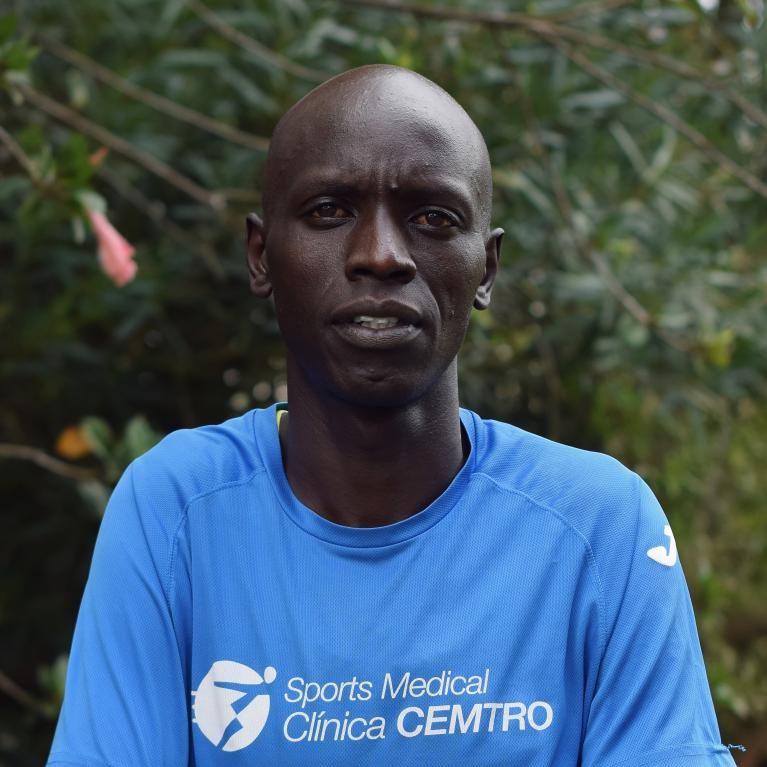
Fiona Bugler already has 20 marathons under her belt. In preparation for the 2025 Brighton Marathon, she spent seven weeks running in Iten, Kenya, with Emmanuel Bundotitch, (pictured above; credit Toni Hiram) a 2:10 marathon runner, as her coach. Here are the top ten tips she took home.
Keep it simple
There’s a gold rush to find out how to create the very best athlete – endless research into sports science, high-tech solutions, optimal nutrition and mindset training. But in Iten and Eldoret, the home of champions and the training ground of a large proportion of Abbott World Major Marathon winners, I discovered that becoming the best isn’t complicated.
A combination of economic need and lack of choice has a way of focusing the mind.
Emmanuel says: "Train six days a week. Have a good programme. Eat well, recover well, be disciplined and be consistent."
Stick to a schedule and be consistent
In Iten, there’s a well-established weekly timetable. Monday: easy run. Tuesday: track. Wednesday: easy. Thursday: fartlek/hills. Friday: easy. Saturday: long. Sunday: easy or rest. Strength and conditioning sessions take place on Monday, Wednesday and Friday.
Most Kenyans also add in a very slow second run of 5K to 10K later in the day.
Consistency is everything. At peak season, about 1,000 athletes train in Iten, almost all following the same daily schedule. Volume is key – marathoners typically log more than 150K per week.
Run slow to run fast
As a coach, a common mistake I’ve spotted among amateur runners is doing their easy runs too fast and their hard runs too slow. Running slowly requires patience and a calm mind. It means letting go of your ego and not worrying about logging seven-minute kilometres on Strava.
In Kenya, the Swahili phrase ‘pole pole’ (pronounced pollay pollay) means ‘slowly’ or ‘little by little’. It’s the foundation of distance running. Running easy allows you to recover, build endurance and stick to a plan.
Fartlek, hills, and track
Speed work in Iten is no-nonsense – run hard, run fast and train with a group that pushes you to your limits. Sessions include fartlek, hills and track work, all held in natural, challenging environments.
Fartlek sessions attract hundreds of runners, tackling anything from short, intense intervals to a gruelling 10K tempo on rocky, hilly terrain. Track sessions take place at the rough, dusty Kamariny track, while hill work happens in stunning forests.
Training alongside elite athletes is humbling; their rhythmic strides sound like a train passing. The key to getting the best from a session, Emmanuel tells me, is to stay calm, embrace the challenge and just do the work.
Train in a group
Emmanuel also says that Kenyans love training in a group, and I quickly saw why. Early morning, synchronised drills, smooth rhythm and focused but relaxed runners. Running in a group helps you to forget about pain, maintain a steady pace and stay motivated. Back home, I resolved to run in a group more often.
Get up early
In Iten, the unwritten rule is to be out of the door between 06:00 and 06:30. By the time I got outside, the roads were packed with runners, schoolchildren and locals starting their day.
“Most Kenyans believe waking up early is a sign of hard work,” Emmanuel explains. “My father told us: ‘If you want to be rich, wake up early.’”
Work from the inside out – core, strength and conditioning
“If you want to maintain a good outside, work on the inside,” says Emmanuel. Without a strong core, your body won’t withstand the battering of high-mileage running. At the High Altitude Training Centre (HATC) in Iten, core classes with coach Richard Mukche – who has trained Olympians – are a staple for success.
Strength training prevents injuries and makes you strong and powerful. Emmanuel reminds me that good form comes from strength. “Even when tired, you can still run with power and good posture.”
Work from the inside out – the mind
Coach Willy Songok grew up with humble beginnings. He reminds visiting Westerners that what we see as problems are often just “surprising situations”.
His philosophy? Stay positive, and this too shall pass — injuries, niggles, setbacks— they’re all temporary. The mind is as important as the body.
Prioritise good sleep
Kenyans are known for prioritising sleep and recovery. Local legend Lornah Kiplagat (owner of the HATC) reportedly slept for 16 hours a day at her marathon peak.
“Sleep, drinking tea and recovery are vital,” Emmanuel tells me. “Kenyans do this well.” He constantly reminded me to sleep early during my time in Iten (I never did!).
Dealing with injury – perspective
Sadly, I got injured while in Kenya, which put my marathon plans on hold.
“These are the challenges we face as athletes,” Emmanuel explains. “It’s not permanent. What matters is how you respond — swap a run for cross-training, ice, massage and rest.” I did and, of course, things improved.
Massage and ice are valued tools in Iten, whether injured or not. A massage costs about 1,000 Kenyan shillings (£6) and I had two a week. It helps boost circulation and reduce inflammation. While some sports scientists debate their effectiveness, these recovery methods remain widely used by champions.
Training in Iten transformed my mindset. The simplicity, discipline and community spirit were inspiring.
The key lessons? Be consistent, train hard but smart, embrace recovery, and trust the process. Whether you’re aiming for a PB or simply looking to enjoy your running more, these Kenyan training principles can help you to reach your marathon goals.